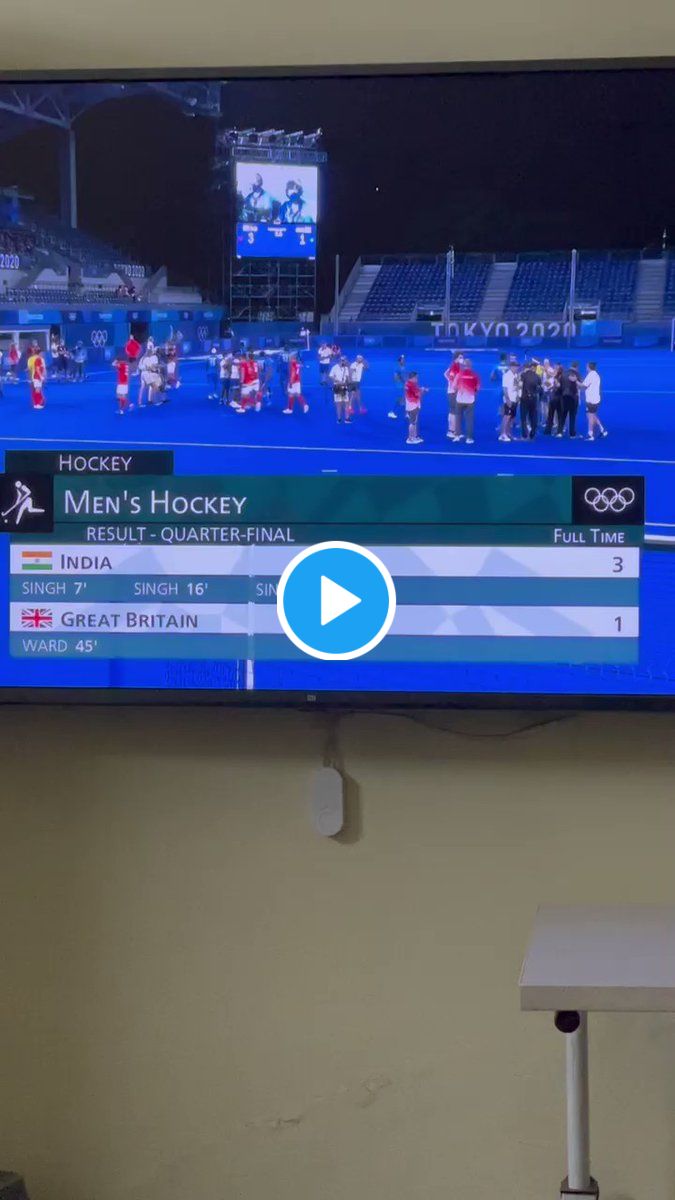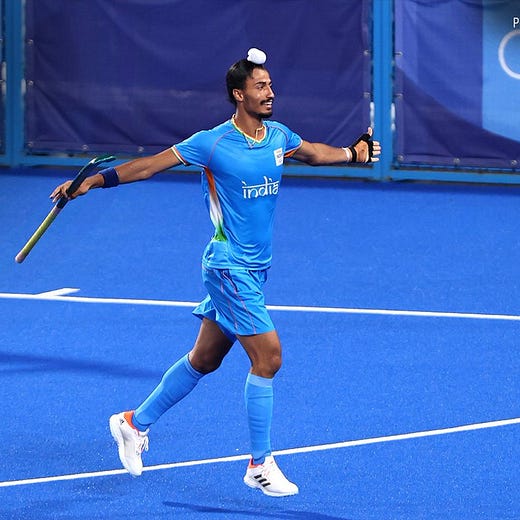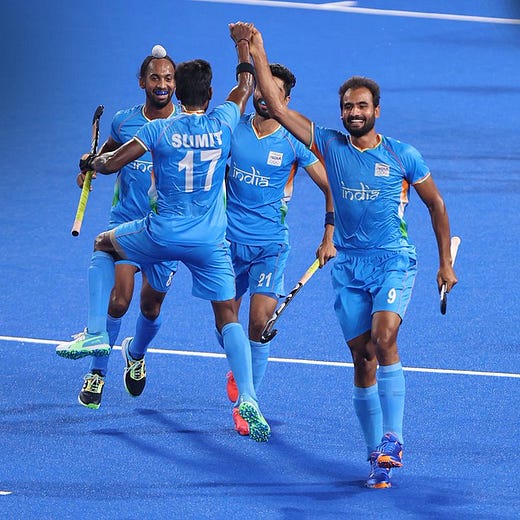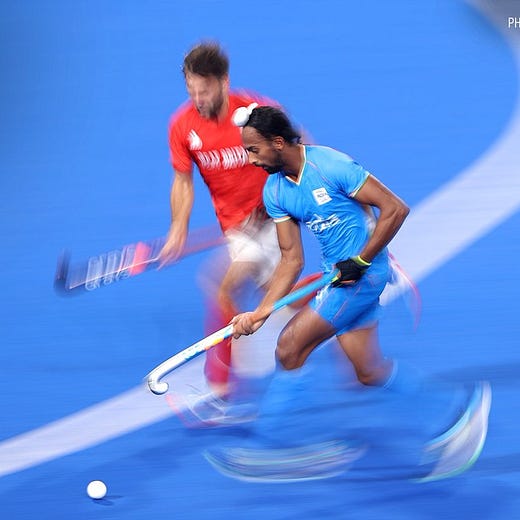Sandeep Singh: Proudly Celebrate Punjabis & Sikhs Of India's Olympic Field Hockey Team
When Punjabis are contributing such a substantial amount to the national team then what is wrong with the celebration of the Punjabi or Sikh identity of those players?
Sandeep Singh
August 2, 2021 | 5.5 min. read | Opinion
After 49 long years, India is playing an Olympic field hockey semifinal game.
This historic moment comes after they defeated Great Britain 3-1 in the quarterfinals on August 1.
All three goals were scored by Singhs that hail from the Punjabi Sikh community. Many, including myself, noted how the match scorecard broadcasted by Sony Liv Channel displayed the three Singhs with pride.
The screenshot of Dilpreet Singh, Gurjant Singh, and Hardik Singh’s names went viral as the country rallies behind its field hockey squad.
Punjab Chief Minister, Captain Amarinder Singh, posted on social media that all three goalscorers were Punjabi players. An obvious, and what should be an uncontroversial, statement to make for a state CM.
He repeated the act on August 2 as well, when India’s women field hockey team defeated Australia 1-0, and Captain noted that Amritsar’s Gurjeet Kaur scored the lone goal securing India’s berth in the women’s semifinal.
Many others noted the feat of Punjab’s players. From media outlets to India’s official Olympic Twitter handle. The latter boasting that “These Singhs are Kings.”
However, for nationalist journalists, politicians, and BJP supporters, the celebration of Punjabi and Sikh players was too much to bear.
One reporter objected to all the limelight by saying, “Singh or no Singh. We are all Indians first. Please focus on India.” As if shining a light on Punjab’s contributions, a state within India last I checked, would diminish the team’s success at the Games.
OpIndia, a right-wing pro-Modi outlet, said Captain was taught a lesson by netizens for removing the Indianness of the players by celebrating their unique identity of Punjab and Amritsar.
The erasure of Punjab’s contributions, and the contributions of a minority community like the Sikhs, by right-wing voices, is extremely problematic.
You cannot ignore the fact, as The Tribune reported, 10 members of the hockey team’s 18 member squad belong to Punjab. Of those 10, eight belong to the Sikh community.
If we go by goals, the most common way to highlight direct contribution on a team, the Indian team has scored 18 goals in the entire tournament, of which 16 were scored by Punjabis.
When Punjabis are contributing such a substantial amount to the national team then what is wrong with the celebration of the Punjabi or Sikh identity of those players? The entire country can take pride in the Indianess of players, while Punjabis and Sikhs can simultaneously take pride in the unique regional and religious identity of players.
All Indian states have their own sub-nationalism.
Punjabis have an especially strong sense of it and are proud to celebrate it no matter where they are in the world. Sikhs are also vocal about their identity, they stand out for a reason, and they will not hide it just to appease right-wing commentators who are insecure by this display of rightful pride.
Many noted that Modi, in 2010, celebrated the Gujarati identity of Lajja Goswami in the same way Captain and others are celebrating the Punjabi and Sikh identity of their field hockey heroes. There was no backlash back then, so why is there one now?
One does not even have to look back to 2010 to see the double standards at play when it comes to Punjabi Sikhs
Haryana’s Chief Minister, Manohar Lal Khattar, tweeted in a similar fashion to Captain, without the blowback. When the Indian women’s hockey team registered a victory against Australia and marched into the semifinal, he mentioned that eight members of the team belong to Haryana. There was no similar objection to the tweet from the same commentators attacking Captain and others like him.
But it is an honest question to ask and ponder deeply. Why cannot players be both Indian and Punjabi, or Indian and Sikhs, at the same time? Is it a prerequisite that we must remove their Sikh and Punjabi identity in order to celebrate their Indianness? Is that what is required for them to be real Indians?
No. A player can be Indian, Sikh, and Punjabi at the same time.
The Punjabis taking part in the Farmers’ Protest, most of them Sikhs, have been dismissed as anti-nationals, Khalistanis, or just unrepresentative of India in general by the very same people commenting on this issue. Punjab, the entire state, has been deemed as a bastion of anti-national behaviour by these right-wing politicians, journalists, and bodies - not for the first time.
So, in such an environment where the Sikh and Punjabi identity is under daily attack, why should not those very same Sikhs and Punjabis assert their identity and celebrate the contribution of their community members during the Olympic Games?
Let me narrate my own experience.
A couple of weeks back, a Hindutva supporter said 80 percent of protesting farmers are Sikhs which makes it clear that Khalistanis are protesting - as opposed to Indians. The incident happened outside Jantar Mantar where farmers are holding a Sansad, or Farmers’ Parliament.
The Farmers’ Protest angle is an interesting one considering the two states leading the fight, Haryana and Punjab, constitute about 40 percent of India’s Olympic team, even though they are only 4 percent of the country’s population.
Those players will be celebrated as Indians, but the farmers they grew up with and are fighting outside Delhi, are labeled as radicals and anti-nationals. Since the demonstrations have begun, not a single nationalist outlet or voice has referred to them as “Indians” protesting the farm laws. They make sure to identify them as farmers of Punjab or Haryana only.
When such sort of hate is being spread against people from a particular region and religion, then those people should assert their identity.
There is nothing wrong with that.
In fact, it is common for people around the world to celebrate the unique identities of those achieving success on the world stage. One example that resonated with me is from the 2018 Football World Cup, which was won by the French Football team.
According to American law professor Khaled Beydoun, 80 percent of that French team was of African descent. Which was particularly jarring when held against issues of racism and xenophobia in France.
South African Comedian and Daily Show host Trevor Noah had said at the time that “Africa won the World Cup.” French Ambassador to the United States, Gérard Araud, objected to Trevor’s statement. Noah aptly replied that “When I'm saying they're African, I'm not saying it to exclude them from their Frenchness, but I'm rather using it to include them in my Africanness.”
The same is true about Sikhs and Punjabis on the field hockey team.
The Sikhs and Punjabis of India rarely get opportunities to freely celebrate their identity considering how those identities are constantly attacked, appropriated, or erased by many people in India. Every day Sikhs are called names and labeled as anti-national if they say something against the government - no matter how valid.
Many Indians, especially right-wingers, love to own and appropriate the success of Punjabis and Sikhs, erasing their unique identity in the process, and celebrate those wins as belonging to the entire country. However, when Punjabis fail at something, they will be sure to put the blame squarely on Punjab. They will never say, for example, that India has a drug problem - but they will be quick to say Punjab has one.
One of the main problems for this is the Hindi, Hindu, and Hindutva policy primarily driven by the BJP. The goal is to paint everyone in one colour. But it will never work.
Now, on the Olympic stage in one of the most popular teams sports of the Games, Punjabis and Sikhs are carrying a country’s hopes. We have every right to celebrate the Punjabiness and Sikhi of the players involved.
Sandeep Singh hails from Machhiwara, Punjab. As an independent journalist, he has worked with many prominent Indian news organizations. Sandeep has been following the farmer’s protest in Punjab since its onset and traveled with them to Delhi. He spends most of his time at the Singhu border protest site. You can follow Sandeep on Twitter @Punyaab
Baaz is home to opinions, ideas, and original reporting for the Sikh and Punjabi diaspora. Support us by subscribing. Find us on Twitter, Instagram, Facebook at @BaazNewsOrg. If you would like to submit a written piece for consideration please email us at editor@baaznews.org.








